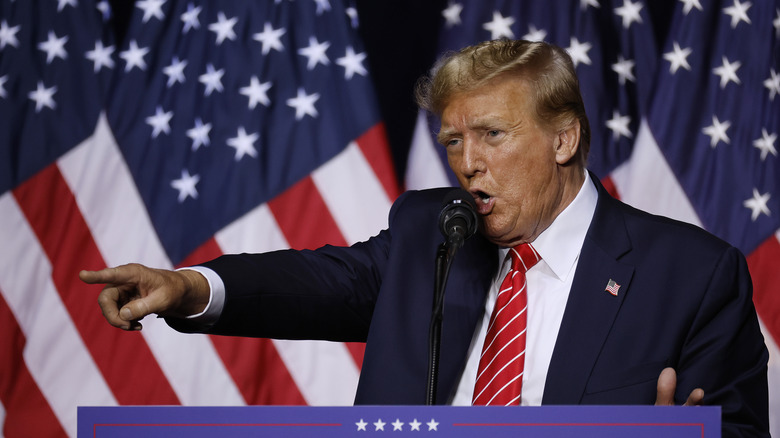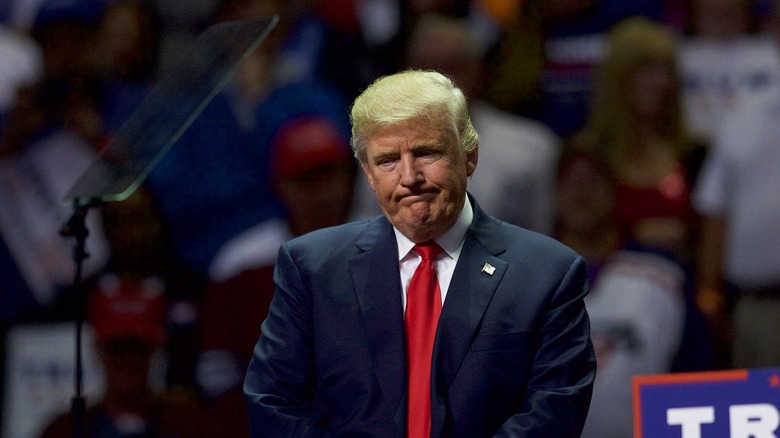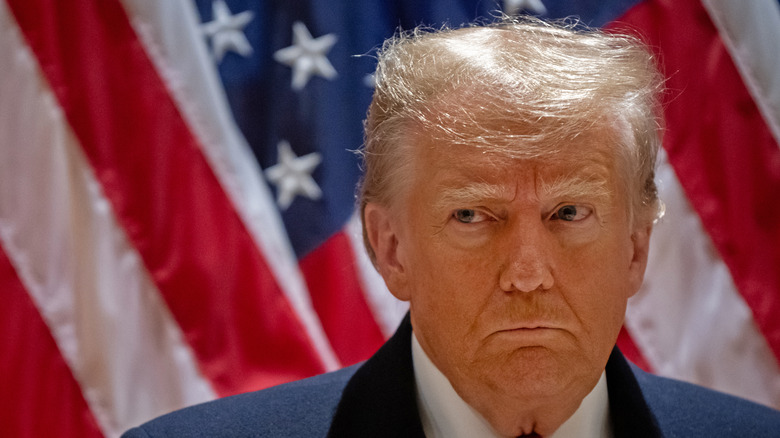Lawyer Tells Us What Will Happen If Trump Can't Pay $454 Million Fraud Trial Fine
With his 2024 presidential campaign well underway, it seems that Donald Trump is facing an unusual conundrum. Trump owes New York State a whopping $454 million, and he doesn't have long to pay it. The fine was instated as a result of his civil fraud case back in February, and he was given until March 18 to pay what he owes.
Despite the former president's repeated assertions that he will have no problem paying the hefty fine, there has been increasing speculation that he doesn't actually have the funds he needs. This is ironic, since the case itself accused Trump of lying about his net worth. If Trump really isn't able to pay the fine, he's surely in for some trouble. But what exactly will happen to him? And what does this mean for the presidential race? We consulted an expert about what Trump's inability to pay would really mean. And, from the sound of it, he has to pay this fine one way or another.
As time runs out and more questions mount about how much money Trump really has, we're all wondering what further potential trouble with the law would be caused by his inability to pay the fine. We spoke to former federal prosecutor and president of West Coast Trial Lawyers, Neama Rahmani, about what exactly is at stake. "If Trump doesn't deposit money with the court or secure an appeal bond," Rahmani said, "he won't be able to appeal his judgment and it becomes enforceable."
If Trump doesn't pay, the money will have to come from somewhere
Donald Trump does not have the choice to opt out of paying the court. Even if he wants to appeal the decision, he is still required to pay bond, which includes added interest. Every day since the initial decision, $112,000 of interest has been added. If he doesn't have the funds, the court will have to take it from his assets.
Neama Rahmani explained to The List how the process would work if that comes to pass, saying, "The attorney general can levy bank accounts, garnish wages, or attach and sell property to satisfy the judgment." Of course, this could have a serious impact on his presidential run, since campaign donations have already been going toward paying back the money he owes. "Trump can and has been using campaign donations to pay his legal fees, and he's spent tens of millions of dollars so far," Rahmani said. "That number will only increase as Trump's criminal trials begin."
Legal analyst Ryan Goodman explained to CNN that the law won't be slow to act if it comes down to it, saying, "The attorney general will kick into action pretty swiftly." In fact, according to him, New York Attorney General Letitia James will likely begin taking money from his assets "immediately." Reporter Jonathan Greenberg added that he believes that Trump is "far less wealthy than he has claimed," which could certainly mean that James would be forced to take the money from elsewhere. Yet, according to Greenberg, "I think he's going to defy the court every step of the way."
Trump insists that money isn't an issue
It's easy to imagine Donald Trump putting up a fight in this situation. Even Attorney General Letitia James predicted that this might be the case. Per CNBC, her own court filing stated, "there is substantial risk that defendants will attempt to evade enforcement of the judgment (or make enforcement more difficult) following appeal."
Regardless of any potential plans Trump has to fight the court, he's continuing to claim that getting the money is not a problem. On March 5, he appeared on Fox News (via X, formerly known as Twitter) and assured the public, "I have a lot of money. I can do what I want to do." When asked if he had any concern about his looming $454 million fine, he insisted, "I don't worry about anything. I don't worry about the money. I don't worry about money."
While he may claim to be unbothered by his debt, it continues to add up. This particular case is not the only legal battle Trump is in. According to The Associated Press, he reportedly owes over half a billion dollars thanks to legal trouble alone. Trump's behavior was on-brand during his fraud trial, and per The Guardian, he called it a "sham prosecution" and "totally corrupt" while promising to appeal. Ultimately, whether he has the money he needs or not, it's safe to say that he's likely to be characteristically defiant when it comes time to pay up.


